Main Stream Master Class Dynamic Parallel AC Line Conditioner by Greg Voth
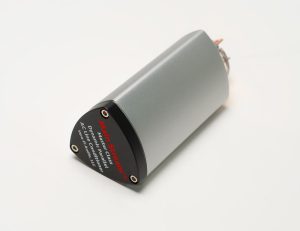
 The Main Stream Master Class Dynamic Parallel AC Line Conditioner, designed by Peter Madnick for Vera-Fi Audio, is a 5-inch long, 3-sided plug-in device, approximately 2 inches wide. Its case is milled extruded aluminum, and the device weighs 10.6 ounces – hefty enough to let you know there’s substantial tech inside yet light enough to stay put when inserted in a wall receptacle. Its plug end glows a faint blue when receiving power. The Main Stream Master has no user-adjustable settings. The Main Stream A/C Conditioner is designed to provide a long life of continuous service. Vera-Fi Audio’s SnubWay – Noise Defender uses this same housing design.
The Main Stream Master Class Dynamic Parallel AC Line Conditioner, designed by Peter Madnick for Vera-Fi Audio, is a 5-inch long, 3-sided plug-in device, approximately 2 inches wide. Its case is milled extruded aluminum, and the device weighs 10.6 ounces – hefty enough to let you know there’s substantial tech inside yet light enough to stay put when inserted in a wall receptacle. Its plug end glows a faint blue when receiving power. The Main Stream Master has no user-adjustable settings. The Main Stream A/C Conditioner is designed to provide a long life of continuous service. Vera-Fi Audio’s SnubWay – Noise Defender uses this same housing design.
According to the Vera-Fi Audio site, “Line interference can cause many undesirable effects on your audio and video signals. The Main Stream uses a combination of reactive elements to [create] tuned filters designed to reduce noise levels known to interfere with your audio enjoyment. Our topology excludes the use of any type of resonant transformer as a wave shaping device and rather [sic] only removes unwanted frequencies.”
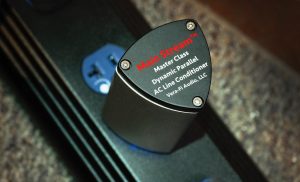
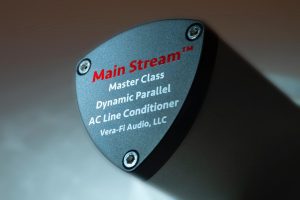
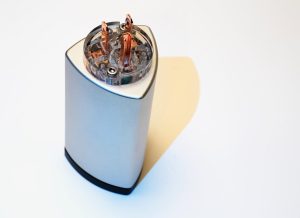
The product description further states that the Main Stream can reduce system background noise to vanishingly low levels, with its effectiveness confirmed via Fast Fourier Transform graphs. The Main Stream A/C Conditioner is designed to provide a long life of continuous service. You’ll be seeing double when viewing the Main Stream beside the SnubWay Noise Defender, as Vera-Fi Audio uses the same housing for each.
Commentary from the Main Stream Master Class AC Conditioner’s Designer
 According to the Vera-Fi Audio LLC website, the Main Stream Master Class Dynamic Parallel AC Line Conditioner “is designed to improve the performance of your high-end audio or video system by reducing the amount of AC Mains-based interference traveling on the wires within your home. This interference is created not only by other components in the system but also appliances and other electrical equipment elsewhere in the house[… s]ometimes even emanating from outside your home!”
According to the Vera-Fi Audio LLC website, the Main Stream Master Class Dynamic Parallel AC Line Conditioner “is designed to improve the performance of your high-end audio or video system by reducing the amount of AC Mains-based interference traveling on the wires within your home. This interference is created not only by other components in the system but also appliances and other electrical equipment elsewhere in the house[… s]ometimes even emanating from outside your home!”
I reached out via email to the Main Stream’s designer, Peter Madnick, who expanded on the text available on the product’s website without divulging anything about the intellectual property contained therein, “Of course, this interference is mostly in the RF range, but things like refrigerators, air conditioners and heaters, washers and dryers; anything with a big motor and put a pulse of energy onto your home AC line and it will be “felt” by other equipment within the home. The energy imposed on the line is absorbed or filtered differently, depending on the frequency band involved. Part of Mainstream’s effectiveness is due to the multiple frequency bands it [affects] while utilizing a simple topology comprising a minimum number of parts.”
Regarding online interference, Madnick responded, “These effects can be experienced individually or in combinations. It is interesting to note that oftentimes the effect (hum, for instance) [is] reduced, but our bands of interest do not include these very low frequencies. We are reducing energy in a band that infers these types of noise reductions.”
Expanding on parallel vs series conditioning, Madrick added, “As you probably know, the other type of line conditioning is called “series.” There are many (maybe most?) products out there [that] plug into the wall and then your component(s) plug into it. With these, the current must pass through the various filter parts on their way to your audio component, necessitating the internal parts being of both high enough voltage and current to support the power demands of the attached product(s). This makes these conditioners both larger and more expensive than a parallel type, and they are often designed to serve somewhat different needs, or sometimes one of just distribution and surge protection.”
Listening to the Main Stream, the Primary Rig
I plugged the Main Stream Master Class AC Line Conditioner on the same circuit with my main rig’s main components (another circuit powers the subs). I’m running two power conditioners, with the Main Stream Master Class plugged into the first receptacle nearest the power entry on the Puritan PSM156 conditioner. My primary components run balanced and receive power through an AER by IPC Sound Power Conditioner.
As the Main Stream settled in over those few days, the rig’s presentation became more enveloping, like a bigger warm hug – relaxed, nurturing, and breathing with musicality. Transients were quick, catchy, and exciting as their dimensional quality grew intoxicating. The soundstage extended in width and increased depth as sounds entered from a more distant, denser black rear stage.
 A play of Simple Gifts from Aaron Copland’s “Appalachian Spring“ (1986 Decca), performed by Antal Dorati and the Detroit Symphony, proved an interesting experiment. With the system and Main Stream warmed up and performing well, the strings spread wide, and string plucks and triangle taps were quick and warm. The soundstage depth was there, along with notable air around the instruments. The basses spoke in growls, and the horns were crisp and authoritative. When the orchestra played as one, I noted relatively wide dispersion.
A play of Simple Gifts from Aaron Copland’s “Appalachian Spring“ (1986 Decca), performed by Antal Dorati and the Detroit Symphony, proved an interesting experiment. With the system and Main Stream warmed up and performing well, the strings spread wide, and string plucks and triangle taps were quick and warm. The soundstage depth was there, along with notable air around the instruments. The basses spoke in growls, and the horns were crisp and authoritative. When the orchestra played as one, I noted relatively wide dispersion.
I removed the Main Stream and found it warm to the touch yet easy to handle. I waited a few minutes before listening again. Without the Main Stream installed, there appeared to be less spread, plucks seemed a bit less distinct and a touch hazy, and a slight lack of vitality to the overall presentation. The triangle was not as prominent, but the basses still growled. The horns lacked that crisp imaging edge that the Main Stream provided, and the orchestra playing together at the end seemed less harmonious.
 Reinstalling the Main Stream, I played Blame It On My Youth from Viktoria Tolstoy’s album of the same title (2001 Parlophone Music Sweden AB). This singer’s delicate and airy delivery rendered an outstanding balance to the piano accompaniment. Tolstoy’s annunciation was flawless, and the timber of her instrument sublime, as is her singing in English, given her Russian ancestry (Russian writer Leo Tolstoy was her great-great-great-grandfather).
Reinstalling the Main Stream, I played Blame It On My Youth from Viktoria Tolstoy’s album of the same title (2001 Parlophone Music Sweden AB). This singer’s delicate and airy delivery rendered an outstanding balance to the piano accompaniment. Tolstoy’s annunciation was flawless, and the timber of her instrument sublime, as is her singing in English, given her Russian ancestry (Russian writer Leo Tolstoy was her great-great-great-grandfather).
Tolstoy’s cover of Midnight Sun is impeccable. Her beautiful voice again offers a counterpoint to the rhythmic, modal, piano trio accompaniment. The strings that entered offered added interest. This vocalist made this song her own with this different take, of sorts… quite a feat, given Nancy Wilson’s much-loved 1967 version from “Lush Life“ on Capitol Records. The Main Stream heightened my enjoyment of this track, providing a quieter background and allowing me to hear more music.
Listening with the Tube Integrated
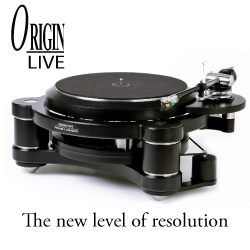 To get a different take on the Main Stream Master Class AC Conditioner’s properties, I connected the speakers and subs to my Opera Consonance M100SE tube integrated with Vera-Fi Audio’s Swiss Digital Fuse Box (SDFB), protecting the integrated (see my review in these pages). With the integrated sans fuse, I use a standard copper Sluggo in the tube unit, with the SDFB receiving power directly from the wall and no other power conditioner in this setup. I plugged up a bluMe Pro HiFi Bluetooth receiver for a quick source. This model BluMe uses an ESS SABER ES9028Q2M D/A converter, and I’m allowing the bluMe Pro to do the conversion rather than sending the signal to my Denafrips Pontus II R2R DAC as I usually do when using the bluMe Pro in the main rig. As always, the M100SE’s 40wpc output handled the efficient Double Impact floor standers beautifully.
To get a different take on the Main Stream Master Class AC Conditioner’s properties, I connected the speakers and subs to my Opera Consonance M100SE tube integrated with Vera-Fi Audio’s Swiss Digital Fuse Box (SDFB), protecting the integrated (see my review in these pages). With the integrated sans fuse, I use a standard copper Sluggo in the tube unit, with the SDFB receiving power directly from the wall and no other power conditioner in this setup. I plugged up a bluMe Pro HiFi Bluetooth receiver for a quick source. This model BluMe uses an ESS SABER ES9028Q2M D/A converter, and I’m allowing the bluMe Pro to do the conversion rather than sending the signal to my Denafrips Pontus II R2R DAC as I usually do when using the bluMe Pro in the main rig. As always, the M100SE’s 40wpc output handled the efficient Double Impact floor standers beautifully.
The circuit this temporary rig is on provides power to all of our loft’s wall receptacles, including video components. Many moons ago, we had two circuits installed for audio and computer use. The kitchen, bath, and basement space run on their own circuits.
 I let music play while I got some thoughts down while sitting at the computer, away from the sweet spot. The Enrico Rava Quintet’s “Tribe“ (2011 ECM Records GmbH) proved the right mood for this diversion. A bit over an hour later, I was ready for more careful listening as the music began distracting me from my writing, sufficiently warmed up to begin another listening session.
I let music play while I got some thoughts down while sitting at the computer, away from the sweet spot. The Enrico Rava Quintet’s “Tribe“ (2011 ECM Records GmbH) proved the right mood for this diversion. A bit over an hour later, I was ready for more careful listening as the music began distracting me from my writing, sufficiently warmed up to begin another listening session.
Once again, in the sweet spot, I played the first few songs from Little North’s self-titled 2020 live release (2020 April Records & Music CO.); each track sounded quite rich with a beautiful depth to the stage and density to the instrumentation. The instruments emanated from a black background, and the instrument images were quite good. With transients quick and dynamics bolder – I felt they also possessed a more excellent range of impact. The upright bass communicated an excellent woody depth that was well-rendered and dimensional.
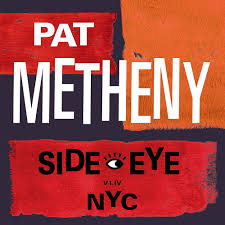 Moving on to Pat Metheny’s 2021 “Side Eye NYC (VI.IV)“ (2021 Modern Recordings), the energy level increased as this band stretched out, creating an excellent atmospheric stage with the melody floating over notable band unity as they played It Starts When We Disappear. This band beats with a huge heart, filling the stage with wonderful dynamics and nuance – big, bold, and, at the same time, intimate in measure. The integrated M100SE tube sounded great, and the Main Stream and components appeared exceptionally well-matched. On this hot June mid-day, with folks running AC units around us, the Main Stream did a stellar job, successfully removing grunge from the loft’s primary circuit. This little rig delivered quite a nice render, with added black in the quiet passages and instrumental impact in the louder Ines.
Moving on to Pat Metheny’s 2021 “Side Eye NYC (VI.IV)“ (2021 Modern Recordings), the energy level increased as this band stretched out, creating an excellent atmospheric stage with the melody floating over notable band unity as they played It Starts When We Disappear. This band beats with a huge heart, filling the stage with wonderful dynamics and nuance – big, bold, and, at the same time, intimate in measure. The integrated M100SE tube sounded great, and the Main Stream and components appeared exceptionally well-matched. On this hot June mid-day, with folks running AC units around us, the Main Stream did a stellar job, successfully removing grunge from the loft’s primary circuit. This little rig delivered quite a nice render, with added black in the quiet passages and instrumental impact in the louder Ines.
Moving the Main Stream back to the Main Rig
I moved the Main Stream back to the main rig, disconnecting the Puritan and plugging it directly into the same wall receptacle that feeds the AER conditioner, powering only my essential components. A play of Kandice Springs’s Soul Eyes, from her 2016 Blue Note Records release of the same title, allowed Springs’ vocal command to expand ever so, deriving greater texture and nuance in her instrument. The front wall kicked back some as the Main Stream relaxed into its new placement.
Podcasts (feat. Braxton Cook), from Gabrielle Cavassa’s self-titled 2020 debut album, is always a fun song to play, as poignant as it is light and airy. Her voice is warm, honey-dipped, and sexy, and her playful vocals extend throughout the album, making it a must-hear quite often. This switch of rigs unlocked more of the Main Stream’s virtues, as it brought fleshiness and blacker, quieter passages during this album’s play.
The Wrap
I love it when an affordable piece of gear brings more to the fore. The Main Stream Master Class Dynamic Parallel AC Line Conditioner brought me ever closer to the music while providing a more nuanced performance. It’s coming soon and is now available for preorder as I write this. As with other Vera-Fi Audio, LLC products, the Main Stream will come with a 30-day money-back guarantee, no questions asked. Please give it a listen.


Specifications:
Main Stream Master Class Dynamic Parallel AC Line Conditioner
Price: $235.00
Contact: Mark Schifter
Vera-Fi Audio LLC
9025 Crestview Drive
Denton, Texas 76207
Website: verafiaudiollc.com
Email: verafiaudio@gmail.com
Phone: (818) 584-6870
Product Description:
Mainstream uses a combination of reactive elements to create tuned filters designed to reduce the levels of noise specifically known to interfere with your audio enjoyment. Our topology excludes any type of resonant transformer from being used as a wave-shaping device and only removes unwanted frequencies.
Laboratory tests prove the effectiveness of MainStream via Fast Fourier Transform graphs
• Capable of reducing system background noise to vanishingly low levels.
• Reasonably priced,
• Milled extruded aluminum case
• Designed for a long life of continuous service
• A faint blue glow shows it is working
• Laboratory tests prove the effectiveness of MainStream via Fast Fourier Transform graphs
Stereo Times Masthead
Publisher/Founder
Clement Perry
Editor
Dave Thomas
Senior Editors
Frank Alles, Mike Girardi, Russell Lichter, Terry London, Moreno Mitchell, Paul Szabady, Bill Wells, Mike Wright, and Stephen Yan,
Current Contributors
David Abramson, Tim Barrall, Dave Allison, Ron Cook, Lewis Dardick, John Hoffman, Dan Secula, Don Shaulis, Greg Simmons, Eric Teh, Greg Voth, Richard Willie, Ed Van Winkle, Rob Dockery, Richard Doran, and Daveed Turek
Site Management Clement Perry
Ad Designer: Martin Perry




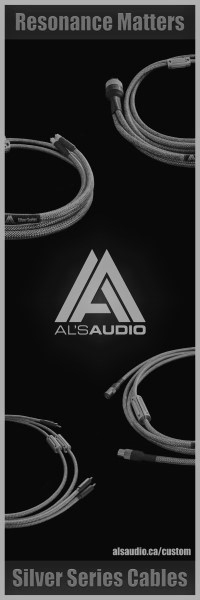
Be the first to comment on: Main Stream Master Class Dynamic Parallel AC Line Conditioner by Greg Voth